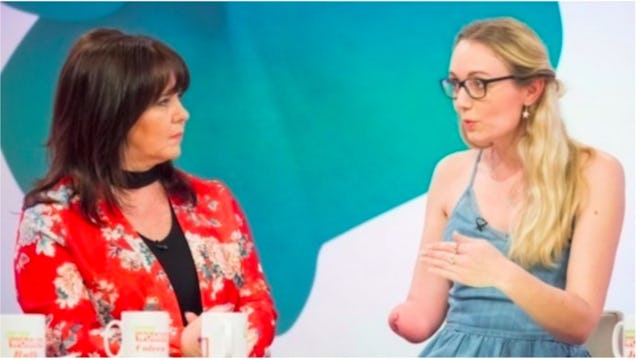This Is Why You Need To Talk To Your Kids About Disabilities

“I don’t love him,” my daughter whispered as she buried her head in my shoulder while we were waiting in line at Dunkin’ Donuts one afternoon.
“Yes, you do,” I whispered. “You do love him. I think you are afraid because he doesn’t look the same way you do. But you don’t need to be afraid; he’s a person,” I whispered back.
My daughter was two at the time, and she was talking about a man who was in a wheelchair with his caretaker; he had limb differences. As he waited for his cup of coffee and donut, he had asked my daughter what she was doing that day.
After our outing, as I was getting her and my 3-year-old son in the car, my son started asking questions. Until that point, I’d never talked with my children about disabilities before — and I was a little too late.
The world is a big place with many people who look different and have different abilities, and it’s up to us parents to start teaching our children early. Because let’s face it, young kids can say, or do, really mean, hurtful things to people without knowing the power of their words or their actions.
But parents know. And it’s something we not only need to teach, it is a topic we need to continually monitor and revisit as needed.
As my kids have gotten older, our dialogue around the subject has changed but it’s always an ongoing conversation. They have a lot to learn, and so do I.
I’m still teaching my teens that disabilities do not define people, and it’s important to do things like always politely ask them if they’d like help before you just assume they need it.
Susan Linn, a psychologist at the Judge Baker Children’s Center at Harvard Medical School, said in an article on Baby Center that you avoid emotion or going into too much detail while discussing disabilities with your children.
It’s also important to teach your children how to “separate the person from the condition.” One way to do this by teaching people-first language. For instance, let your kids know you don’t say “disabled person,” but rather, “person who is disabled,” and avoid using words like “normal” when you are speaking about a person who does not have a disability.
But a parent’s work and responsibility do not end there. Devarshi Lodhia recently wrote about the importance of consent with it comes to a people with disabilities in an article in The Guardian. Lodhia has one hand and explained how one day after work, a young boy who was accompanied by his mother walked up to him and started “grabbing” his left arm.
“Rather than intervening or saying anything, his mother simply sat there and smiled at me as her son treated my arm like a toy, inspecting it from different angles, prodding it, and moving it around,” he wrote.
“At no point was my comfort with the situation considered,” he wrote. This so far beyond inappropriate, disrespectful, and completely violates someone’s bodily autonomy. Although Lodhia noted that the boy was only 6 or 7, he was not too young to be taught about consent and how it’s unacceptable to walk up to a person and touch their body for as long as they want, especially without asking first.
In another article for The Guardian, Lodhia explains how people who have disabilities are not “brave” after such a comment was made to him one night at a club. He says doing so can be “quite a damaging label” because people with disabilities want to “go about their lives like everyone else, that we– as a society–can move beyond such outdated notions as bravery.”
Cerrie Burnell, ex-presenter for BBC’s children channel CBeebies, who was born with only one hand, got some disturbing comments from parents saying their kids were “scared” after watching, and her appearance was giving them nightmares.
Burnell later said in an interview, “Nine people went to the length of lodging official complaints with the broadcaster, because she decided not to wear her artificial limb.”
Listen, folks: It’s not up to a person with disabilities to tell our children they don’t want to be touched or stared at or made fun of or bullied for any reason. It’s our job as parents to educate our children how to behave around all people, and explain what disabilities are while letting them know they don’t define a person. And it’s never, ever okay to make them feel uncomfortable for being who they are.
Teaching our children about consent goes beyond us teaching them no one is to touch them without their permission. We have to educate them about bodily autonomy and that consent is a right every person has, no matter what, and our teachings need to be sure to include people with disabilities.
It’s not okay for a child to walk up to anyone and just start touching them, and while it may be awkward for you if your child does this, think about how uncomfortable it is for the person who is being touched against their will.
You may not know how to handle it, you may fumble and wish you’d done better. I know I have many times. But educating ourselves, and our children, about about consent and how to treat others with respect and kindness is worth some awkward moments. The onus is on us to raise inclusive, kind humans.
This article was originally published on